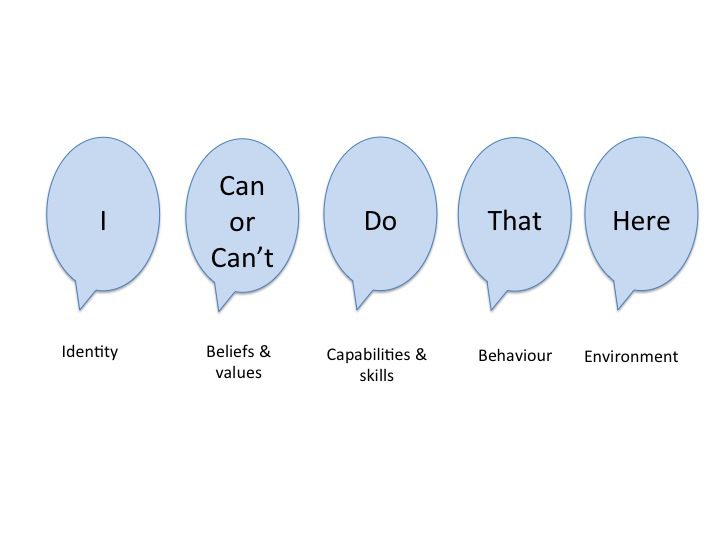How many times have you gone on a course and it’s totally worked for you? Equally, how many times has the reversed happen too? I’m guessing a mix of both. If you put the quality of the trainer to one-side, what do you think could be causing this difference? As someone who works with clients to help them achieve their goals, there is a framework to help understand why sometimes things stick and other times not.
One way of understanding this is the model of ‘neurological levels’. Created by Robert Dilts, based on the work of Gregory Bateson, it posits that in order for change to occur, all the levels in the model below have to be aligned. And if they aren’t, then any work one is doing on a personal or group wide basis simply may not be as effective.

How does this work in reality?
If you look at this briefly, you can see how this works and where it may have applied to any training you’ve had in the past. I want to use as an example, the idea of going on a training course to be a better presenter. I’ll start at the bottom of the model and work my way up:
Environment – when creating a presentation, you need to be in the right environment to do so. That can be the physical environment you are in – so whether it’s light or dark, the noise levels around you, your proximity to other people, the decor, open plan or closed office and so on. As an example, Steve Jobs famously designed the Pixar building for interactions with unlikely people.
Behaviour – if you were to write and deliver a presentation, your behaviour is vital e.g. you turn up prepared, looking professional, in the right mental state etc. These sound obvious and equally, are you always the best prepared you can be?
Capabilities – these are also the skills that we need to be a good presenter. It’s this area that a lot of coaching / training work is done. It’s here that people can be taught the right tools and skills to be better at what they do.
Beliefs – however, if the person with the new skills simply doesn’t believe that they are say a good presenter, then they will (un)consciously sabotage their new skills. Think of someone who you know is naturally good at something, yet doesn’t believe in themselves. Are they fulfilling their potential? It’s here that a good coach and trainer will start to enhance your capabilities and work on improving your beliefs.
Values – values are unconscious and are what motivate us. We can’t tangibly touch a value and we know that they’re there. For example, freedom and success are massive drivers for a lot of individuals. And even though we can’t hold them, we know when we do or don’t have them. What this means from a training perspective is that even if we are able to have all of the skill and all of the belief, if say ‘presenting’ is not an important motivator in someone’s career, then they will again and perhaps (un)knowingly, sabotage their new skills. Again, think of a colleague who’s perhaps got it all in terms of skills and beliefs and yet perhaps doesn’t fulfil their full potential. Often it’s because what they are doing simply isn’t important (enough) to them.
So as you can see, that’s why some training / coaching work can work and sometimes if not developed across all of these levels, fail. What’s vital when working with a trainer is that they are able to align all of these areas. If they are, then they are more likely to be able to help your company achieve its goals.
It’s what we do at Now Go Create with many of the teams we work with. Our Creative Ninjas workshop for example works on absolutely giving new skills and beliefs to teams and our feedback scores of 90%+ favourability demonstrate that. In relation to values work, our ‘Top Dog’ programme helps teams leading business’ to help bring everyone along on the same journey.
I also coach many high profile business and sports people on an individual basis to help instil new beliefs and deliver high performance whatever the field. Please get in touch if you’d like to up the ante in your business performance whether it be presenting, pitching or creative confidence.
Written by James Mallinson, Business Coach and Founder of Fix My Mind.

